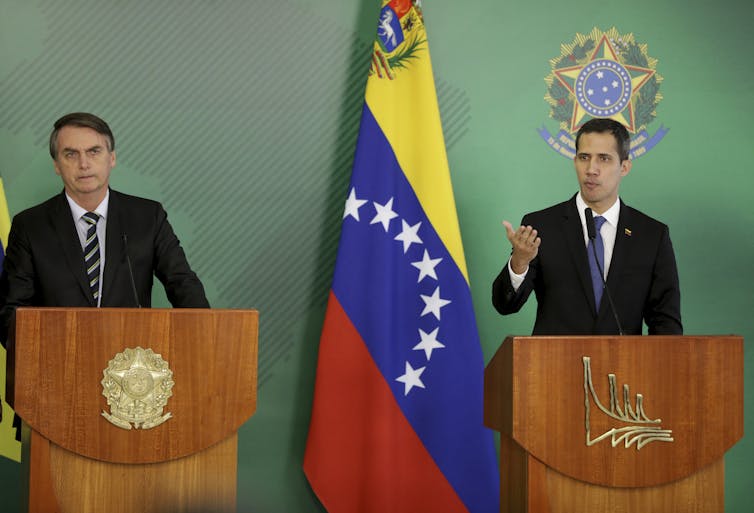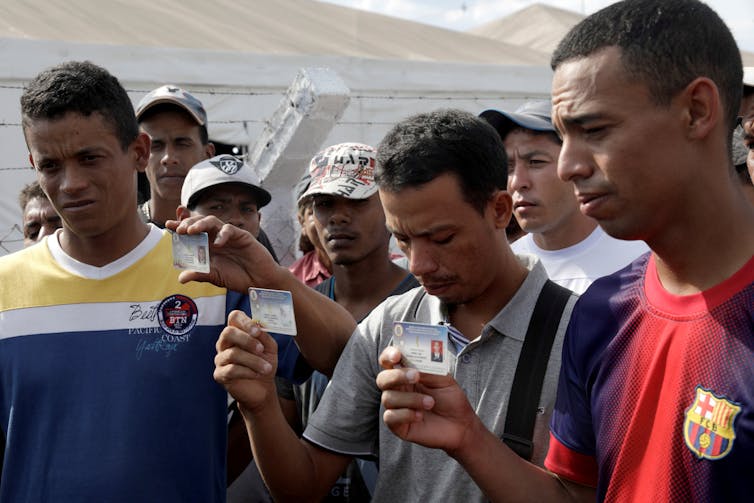US pulls diplomats from its embassy in Caracas, and tensions between Venezuela and Brazil escalate
- Written by Robert Muggah, Associate Lecturer, Pontifical Catholic University of Rio de Janeiro (PUC-Rio)
The United States will withdraw all remaining staff from its embassy in Venezuela[1], according to a late-night March 11 announcement by Secretary of State Mike Pompeo on Twitter, who cited the “deterioriating situation[2]” there.
Since March 7, a power outage[3] has crippled much of Venezuela, including Caracas, the capital.
Venezuela has been in a severe economic and humanitarian crisis since 2016. Now, a tense showdown[4] between President Nicolás Maduro and the head of the opposition-led National Assembly, Juan Guaidó, has created political chaos. In late January, following a presidential election criticized domestically and internationally for irregularities[5], Guaidó declared himself interim president of Venezuela.
The United States supports Guaidó’s bid to unseat the Venezuelan president. Maduro blames the U.S. government for the blackout[6], saying it’s a ploy to debilitate his government.
Relations between Venezuela and neighboring countries are little better.
Colombia and Brazil – like most Latin American countries – have recognize Guaidó as the rightful president of Venezuela. Their governments have amassed hundreds of tons of medical and food supplies at their borders with Venezuela.
Maduro, who condemns the humanitarian convoys as the pretext for a U.S.-led military invasion[7], refuses to allow the aid through[8]. Clashes between security forces and demonstrators trying to bring in supplies[9] have killed an estimated seven protesters near the Colombian border and 25 demonstrators[10] near the Brazilian border.
Though he has quietly welcomed planes bearing humanitarian assistance from Russia[11], an ally, Maduro closed[12] Venezuela’s land borders with Brazil and Colombia, and severed diplomatic ties with Colombia[13].
Militarizing the border
The recent clashes over humanitarian aid have heightened the risk of conflict between Venezuela and Brazil[14], too.
As a researcher of crime and violence[15] in Latin America, I have watched with concern as Brazilian President Jair Bolsonaro militarizes the country’s border[16] in response to Venezuela’s crisis.
Bolsonaro, a right-wing former military captain[17], is an admirer of U.S. President Donald Trump and a fierce critic of all leftist governments – including Venezuela’s. He has promised[18] to do “everything” necessary to help Guaidó restore democracy.
In February, Bolsonaro received Guaidó – then on an impromptu diplomatic tour[19] of Latin America – at the presidential palace in Brasília[20] with all the pomp of a state visit.
Guaidó is not the only Venezuelan to arrive in Brazil recently.
Every day, thousands of Venezuelans[21] pour into neighboring countries, fleeing hunger, poverty and scarcity. There are over 3.4 million Venezuelan refugees and migrants[22] worldwide, according to the United Nations.
Colombia has received the brunt of the mass exodus, receiving over 1.1 million refugees and migrants[23]. But an estimated 96,000 Venezuelans have also come to Brazil[24] since 2017, most arriving on foot to the northern Brazilian border state of Roraima. Roughly 65,000 of those Venezuelan migrants have applied for asylum in Brazil[25].
To manage the influx, Brazil plans to double[26] its already significant military presence[27] at the Venezuelan border, where at least 3,200 soldiers were sent in 2018[28] to “guarantee law and order.”
Meanwhile, Venezuelan security forces in tanks[29] patrol the border with Brazil to enforce Maduro’s Feb. 21 order that nothing[30] – not aid, not migrants – crosses between the two countries.
The Brazilian Ministry of Defense is negotiating[31] with the Venezuelan army to prevent further violence over humanitarian aid delivery and remove some heavy artillery from both sides of the border. And Brazilian Vice President Hamilton Mourão, a four-star general, says Brazil rejects[32] taking any “extreme measures” in Venezuela.
But the potential for a military confrontation[33] feel very real.
Bolsonaro has dispatched planes with 22 tons of rice, powdered milk and medical kits[34] to Roraima to help the roughly 5,200 Venezuelan refugees and migrants living in shelters and on the streets there.
Efforts by Venezuelan opposition supporters to bring some of that aid into Venezuelan territory have been forcefully rebuffed. Venezuelan security forces set up barricades, fired tear gas and targeted demonstrators.
The Brazilian military intelligence website Defesa Net reports that Venezuela has moved anti-aircraft missiles to the border[35], spurring open speculation[36] in Brazil about how a war with its heavily militarized northern neighbor might play out.
Violence at the borders
Officially, Brazil rejects military intervention in Venezuela.
It is part of the Lima Group, a coalition of 14 Latin American governments and Canada that recommends a managed exit[37] by Maduro to resolve Venezuela’s crisis. The group is pushing Maduro to relinquish his power and leave the country, allowing Guaidó to lead a transitional government and call new elections.
But Bolsonaro[38] considers Maduro’s government to be a “dictatorship[39],” and he has sparred with his Venezuelan counterpart on social media[40].
During Brazil’s 2018 presidential campaign, Bolsonaro’s youngest son Eduardo – a hot-headed 34-year-old congressman and Steve Bannon booster[41] – even called for the assassination[42] of the Venezuelan leader. He still publicly supports “removing[43]” Maduro.
Maduro, for his part, has labeled Bolsonaro a fascist and the “Hitler of modern times[44].” He accuses both Bolsonaro and Vice President Mourão of being U.S. puppets[45].
 Brazilian president Jair Bolsonaro, left, at a public event with Venezuelan opposition leader and presidential contender Juan Guaidó in Brasilia on Feb. 28, 2019.
AP Photo/Lucio Tavora[46]
Brazilian president Jair Bolsonaro, left, at a public event with Venezuelan opposition leader and presidential contender Juan Guaidó in Brasilia on Feb. 28, 2019.
AP Photo/Lucio Tavora[46]
Battles over humanitarian aid
Bolsonaro has toned down his belligerent rhetoric as Venezuela’s political crisis has spiraled out of control, focusing on the need for democracy[47] and humanitarian aid in Venezuela.
This is likely at the urging of Vice President Mourão and other generals who hold cabinet positions in his government[48]. Brazil’s military, it’s clear, wants to avoid[49] a messy and protracted conflict with its northern neighbor.
Mourão has disputed claims that the U.S. is establishing a military base in Brazil[50], saying that under no circumstances[51] would Brazil allow U.S. troops to enter Venezuela through Brazil.
He says the only possibility of conflict with Venezuela is if Brazil is attacked first[52].
Still, Brazil’s official rejection of President Maduro represents a dramatic break from tradition. Virtually every Brazilian government since the end of military dictatorship in 1985, both left and right, has practiced a non-interventionist foreign policy[53] and respected the national sovereignty of its neighbors.
 Members of Venezuela’s National Guard who defected to Brazil show their military IDs near the border in Pacaraima, Brazil, on Feb. 24, 2019. Hundreds of Venezuelan military servicemen have fled to Colombia and Brazil in the past month.
Reuters/Ricardo Moraes[54]
Members of Venezuela’s National Guard who defected to Brazil show their military IDs near the border in Pacaraima, Brazil, on Feb. 24, 2019. Hundreds of Venezuelan military servicemen have fled to Colombia and Brazil in the past month.
Reuters/Ricardo Moraes[54]
But Venezuela is an unprecedented challenge – a political, humanitarian and migration crisis of a scale never before seen in Latin America[55].
All of South America hopes to avoid a civil war[56] that could spill over into the region. As Bolsonaro is learning, humanitarian aid, migrants and political relations with Maduro must be handled with extreme caution.
The president’s influential youngest son[57] doesn’t seem to have received the memo[58].
On Feb. 23, Eduardo Bolsonaro tweeted that Maduro will only be ousted “with gunshots[59].”
This story is an updated version of a story[60] originally published on March 7.
References
- ^ withdraw all remaining staff from its embassy in Venezuela (www.npr.org)
- ^ deterioriating situation (www.nytimes.com)
- ^ power outage (www.npr.org)
- ^ tense showdown (theconversation.com)
- ^ criticized domestically and internationally for irregularities (theconversation.com)
- ^ blames the U.S. government for the blackout (www.reuters.com)
- ^ U.S.-led military invasion (theconversation.com)
- ^ to allow the aid through (theconversation.com)
- ^ trying to bring in supplies (shilfa.com)
- ^ 25 demonstrators (www.aljazeera.com)
- ^ Russia (www.bbc.com)
- ^ closed (www.nytimes.com)
- ^ severed diplomatic ties with Colombia (www.nbcnews.com)
- ^ risk of conflict between Venezuela and Brazil (www.foreignaffairs.com)
- ^ crime and violence (www.foreignaffairs.com)
- ^ Brazilian President Jair Bolsonaro militarizes the country’s border (oglobo.globo.com)
- ^ right-wing former military captain (theconversation.com)
- ^ promised (internacional.estadao.com.br)
- ^ diplomatic tour (edition.cnn.com)
- ^ at the presidential palace in Brasília (g1.globo.com)
- ^ thousands of Venezuelans (theconversation.com)
- ^ over 3.4 million Venezuelan refugees and migrants (www.unhcr.org)
- ^ 1.1 million refugees and migrants (www.unhcr.org)
- ^ 96,000 Venezuelans have also come to Brazil (www.unhcr.org)
- ^ applied for asylum in Brazil (data2.unhcr.org)
- ^ double (www.reuters.com)
- ^ significant military presence (www.bbc.com)
- ^ 3,200 soldiers were sent in 2018 (agenciabrasil.ebc.com.br)
- ^ tanks (www.forte.jor.br)
- ^ nothing (www.cnbc.com)
- ^ negotiating (www.terra.com.br)
- ^ rejects (agenciabrasil.ebc.com.br)
- ^ military confrontation (www.miamiherald.com)
- ^ planes with 22 tons of rice, powdered milk and medical kits (g1.globo.com)
- ^ moved anti-aircraft missiles to the border (www.defesanet.com.br)
- ^ open speculation (super.abril.com.br)
- ^ managed exit (istoe.com.br)
- ^ Bolsonaro (theconversation.com)
- ^ dictatorship (exame.abril.com.br)
- ^ on social media (exame.abril.com.br)
- ^ Steve Bannon booster (twitter.com)
- ^ assassination (www.youtube.com)
- ^ removing (www.brasil247.com)
- ^ Hitler of modern times (oglobo.globo.com)
- ^ U.S. puppets (edition.cnn.com)
- ^ AP Photo/Lucio Tavora (www.apimages.com)
- ^ democracy (g1.globo.com)
- ^ cabinet positions in his government (brazilian.report)
- ^ avoid (www.bol.uol.com.br)
- ^ U.S. is establishing a military base in Brazil (www.reuters.com)
- ^ under no circumstances (www.reuters.com)
- ^ if Brazil is attacked first (g1.globo.com)
- ^ non-interventionist foreign policy (www.americasquarterly.org)
- ^ Reuters/Ricardo Moraes (pictures.reuters.com)
- ^ of a scale never before seen in Latin America (www.washingtonpost.com)
- ^ civil war (www.foreignaffairs.com)
- ^ influential youngest son (www.theguardian.com)
- ^ received the memo (ultimosegundo.ig.com.br)
- ^ with gunshots (www.msn.com)
- ^ story (theconversation.com)
Authors: Robert Muggah, Associate Lecturer, Pontifical Catholic University of Rio de Janeiro (PUC-Rio)

